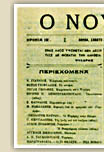
a forum for discussion; and a mouthpiece of change and
reform.
Noumas was the most important contemporary periodical in the struggle for demotic Greek and educational reform.
It was founded by Dimitrios Tangopoulos in about 1901. It adopted
demotic Greek in all its columns, implemented a crusade in defense of the potential of demotic Greek and thus stood apart from those periodicals and scholarly texts that
favoured demotic Greek without, however, using it. Not surprisingly therefore, Noumas consisted not only of
theoretical arguments but also parodies and satirical comments on its opponents.
But around 1908 Noumas demoticists were divided in regard to the language question into
dogmatists (under Yannis Psicharis) and reformers (Manolis Triantafyllidis, Alexandros Delmouzos);
and, in regard to socio-political beliefs, into socialists (Kostas Chatzopoulos) and nationalists (Ion Dragoumis).
At the time of the educational reforms, implemented by the triumvirate of the Society for Education, Noumas
wavered in its support, disagreeing with many
of the policies of the educational reformers and especially with its 'mixed' language; henceforth Noumas
engaged in a parallel struggle against katharevousa and mixed linguistic forms.
|
 |

Apart from suspicions based on personal conflicts, which dictated Noumas's the negative attitude
to reform, the socialist sympathies of the periodical also led it to think of refom as a bourgeois movement. But the fact that Noumas looked favourably on the liberal-Venezelist programme, betrays a certain confusion
in its sympathies.
Noumas continued to be published until 1931 (aside certain interruptions, from 1917-1918 and from 1924-1929) but it
gradually turned into a literary review. During its last phase it lost the support of most contemporary intellectuals and writers, largely because of its different views
in matters of language and aesthetics. In 1931, the periodical that has left its mark
in the struggle for demotic Greek, finally went out of print.
Other significant periodicals were Techni (Art) and Dionysos.
Techni was in print for only one year, 1898, and was written entirely in demotic Greek - it was the first periodical before Noumas to take such a step.
Its founders were inspired by the common desire for the renewal of art and
linguistic change. Its main interest was to familiarize the Greek public
with modern European movements -Symbolism in particular, the then dominant movement in Europe. It published interviews
and literary excerpts, and with writers such as Papadiamantis, Karkavitsas, Xenopoulos and the innovative
Kostas Chatzopoulos,
who was also the publisher of the periodical, and Konstantinos Theotokis.
Techni's ideas were followed by Dionysos (1901-2) under the directorship
of Dimitris Chatzopoulos (Boem) - Kostas Chatzopoulos's brother - and Yannis Kambisis.
|
 |
